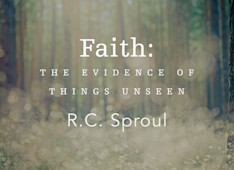A Hopeful Vision
“Now faith is the assurance of things hoped for, the conviction of things not seen. For by it the people of old received their commendation” (Heb. 11:1–2).
Because we have been looking at how Abraham is the best example for our own justification by faith, it will be helpful for us to study what the Bible says about this Christian virtue. For the next six days we will examine the nature of faith using the teaching series Faith: The Evidence of Things Unseen by Dr. R.C. Sproul as our guide.
First, let us consider hope as it is part of the discussion of faith in today’s passage. In everyday parlance, hope commonly refers to an emotional state regarding something we desire to see happen but about which we cannot be certain beforehand. For example, we may “hope” a favorite team has a winning record without being sure before the start of the season that it will. Biblical hope, on the other hand, refers to a future that is certain because it is founded on the promises of our trustworthy Lord. Hope is therefore an anchor for the soul (Heb. 6:19) because God’s Word is supremely reliable.
Let us look at what faith does. “Faith is the assurance of things hoped for” (Heb. 11:1). Assurance (“substance,” in other translations) refers to the tangible reality of our hope. If “what is hoped for” is God’s promise — an eternal, resurrected life with Him in a renewed creation — then our faith in what God has done through Jesus, wrought by His Spirit in us, acts as our guarantee, our assurance.
Faith is also “the conviction (“evidence,” in other versions) of things not seen.” The apostles do not call us to believe without evidence but exhort faith based on eyewitness testimony about Christ (2 Peter 1:16). As Dr. R.C. Sproul says: “I do not know what tomorrow will bring, but God does. If I trust Him for tomorrow, I have faith in something I have not seen. But that faith is an evidence because its object is God, who has a track record and who is infallible.” The fact that we exhibit faith means that we are indwelt by the Holy Spirit, which Spirit serves as our evidence, our conviction, or as Paul writes, the “firstfruits” (Rom. 8:18ff.). Therefore it is not a “blind” faith or a delusion, because our trust is in the One who has proven Himself throughout history as well as to us, by calling us out, those who were once outside the covenant, and giving to us its blessings.
Coram Deo
The Christian life is a pilgrimage of faith. Hebrews 11:2 tells us that by faith “the people of old received their commendation.” Is your faith worthy of commendation? Do you trust the Lord in all your circumstances? To strengthen your trust in Him, consider where you find it difficult to trust God and then think about where He has been faithful. Look for His moving hand throughout the day, and encourage someone with strong faith, thanking him for his example.

